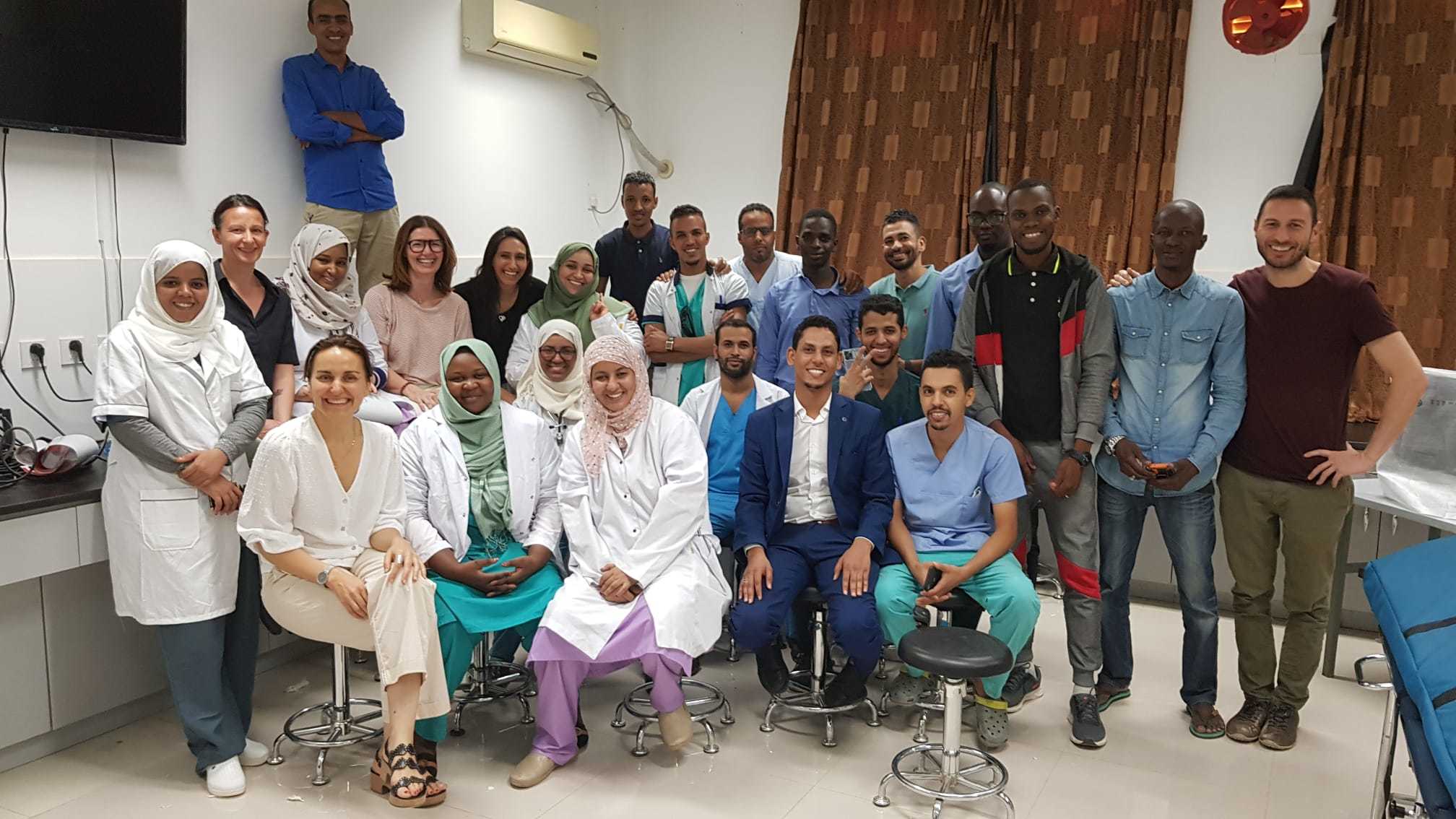Monarchy Queen Letizia, surprised by a sand storm in Mauritania
Travel Food security and gender violence on the first day of Queen Letizia in Nouakchott
The Nouakchott
Faculty of Medicine
is accessed through glass doors embedded in walls over six meters high.
On each side of the doors, holes as long as the wall, with a wrought iron lattice that replaces the glass, serve as windows.
Once past the entrance, one realizes that these openings serve as corridors so that the air circulates and the stay in the courtyard is not unbearable.
He also reflects on the fact that the height of the walls serves to hold back the sand of the desert, because behind the door what there is is
kilometers of nothing
, of plain and tons of sand.
This Wednesday, hundreds of university students were waiting in single file in the courtyard.
Most, with their white coat on.
All provided with the latest model of IPhone and they protected by sunglasses.
Among them, suddenly
a white woman
dressed in Western clothing monopolizes the limelight of the media.
"I've been coming here for four years and I've never been asked so much about this," she confesses, referring to the reason for her stay in Nouakchott.
It is
Marta Bernardino
, director of the Simulation Center of the Alcorcón Foundation University Hospital and a cooperator since 2019. And she recognizes, with this scale of the level of media interest in her work, that
the Queen's visit to Mauritania
is a great showcase to show the projects that the Spanish Cooperation has in the country.
Being in Mauritania and studying a career as long as Medicine shows that they really want to
Bernardino is one of the five doctors who have been participating in the specialist training project at the University of Nouakchott since 2020.
In a place where medicine focuses on
primary care
and there are hardly any specialists, the Spaniard Marta is in charge of
training future
Mauritanian anaesthetists.
It all started with a first reconnaissance trip in 2019. Since then, and with Covid in between, he has returned three more times to Mauritania, where he already teaches courses to university students.
Cooperation, as she acknowledges with a smile, hooks.
Dr. Bernardino with some of the students and professors to whom she has taught the last courseEL MUNDO
"This is the best, they really appreciate and greatly value the effort we make by coming here," he says.
"They also value that we are doctors just like them. In addition, teaching residents here has a practical part that is greatly supporting the Spanish Cooperation. That is what we do in the missions, we focus on practical training."
So in the courses he teaches at the University of Nouakchott, Bernardino teaches students with a vocation to train them so that one day they will be the ones to teach the specialty to their classmates.
"The students have a very good will to learn,
much harder working conditions than
ours, and we try to adapt the training to their means," he says.
"Being in Mauritania and studying a career as long as Medicine shows that they really want to".
The first time he entered the faculty, he was surprised by the number of
women
there despite being an Islamic Republic.
Although the university is accessible only to a privileged minority, almost half of the people who walked through the courtyard of the educational center were women who attend their courses in mixed classes.
"I was surprised when I started coming here,
there are many women who are going to be doctors and they are brilliant
," she says, before clarifying: "Men are too, but especially them."
Spanish Cooperation
contacted her five years ago with a clear objective: to help developing countries move towards Universal Health Coverage.
They had
financing of 300,000 euros
, with which Marta and the rest of the doctors went to work to equip the simulator with which they train future specialists.
"We were looking for something versatile, that was not the most expensive and that would be used for many things. The most expensive simulators are damaged a lot and here it is not worth it", she tells about the process to start the project.
Ultimately, they chose "an upper mid-range simulator".
Thanks to this material, only on the four-day trip that she has made this time -coinciding with the Queen's visit-, Marta and her team have worked "in an immediate life support course endorsed by the Spanish Council of Resuscitation and the European society of the European Resuscitation Council".
Once teachers and students have been trained in this course, they all practice what they have learned until Marta's next trip.
She, who acknowledges that it takes "four years to train an anaesthetist", is clear about her goal: "Every year to choose the best to become trainers".
And so, little by little, the trips of this Spanish aid worker are more and more dilated and Mauritania can be
autonomous in the training of anesthesiologists
.
When this project ends, Marta hopes to continue cooperating in other places and that other Spanish doctors join these campaigns, which can be found on the website of the medical association.
Conforms to The Trust Project criteria
Know more
Real home
Queen Letizia

